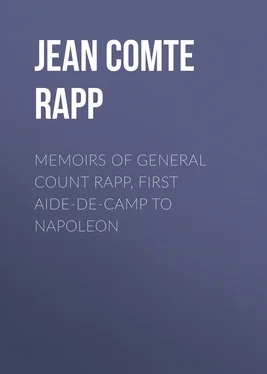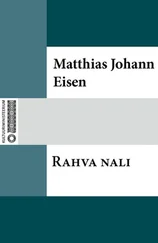Jean Comte Rapp - Memoirs of General Count Rapp, First aide-de-camp to Napoleon
Здесь есть возможность читать онлайн «Jean Comte Rapp - Memoirs of General Count Rapp, First aide-de-camp to Napoleon» — ознакомительный отрывок электронной книги совершенно бесплатно, а после прочтения отрывка купить полную версию. В некоторых случаях можно слушать аудио, скачать через торрент в формате fb2 и присутствует краткое содержание. Жанр: Биографии и Мемуары, История, foreign_edu, foreign_antique, foreign_prose, на английском языке. Описание произведения, (предисловие) а так же отзывы посетителей доступны на портале библиотеки ЛибКат.
- Название:Memoirs of General Count Rapp, First aide-de-camp to Napoleon
- Автор:
- Жанр:
- Год:неизвестен
- ISBN:нет данных
- Рейтинг книги:5 / 5. Голосов: 1
-
Избранное:Добавить в избранное
- Отзывы:
-
Ваша оценка:
- 100
- 1
- 2
- 3
- 4
- 5
Memoirs of General Count Rapp, First aide-de-camp to Napoleon: краткое содержание, описание и аннотация
Предлагаем к чтению аннотацию, описание, краткое содержание или предисловие (зависит от того, что написал сам автор книги «Memoirs of General Count Rapp, First aide-de-camp to Napoleon»). Если вы не нашли необходимую информацию о книге — напишите в комментариях, мы постараемся отыскать её.
Memoirs of General Count Rapp, First aide-de-camp to Napoleon — читать онлайн ознакомительный отрывок
Ниже представлен текст книги, разбитый по страницам. Система сохранения места последней прочитанной страницы, позволяет с удобством читать онлайн бесплатно книгу «Memoirs of General Count Rapp, First aide-de-camp to Napoleon», без необходимости каждый раз заново искать на чём Вы остановились. Поставьте закладку, и сможете в любой момент перейти на страницу, на которой закончили чтение.
Интервал:
Закладка:
Klein, however, persisted in his demands, and Werneck himself urged the fulfilment of the conditions that had been entered into. They required that the officers included in the capitulations should surrender themselves prisoners. The French General addressed his remonstrances to the Archduke, or, in his absence, to the General commanding the Austrian army; but such disorder prevailed, that the flag of truce was obliged to advance into the very heart of Bohemia before he could find an officer to receive his dispatches. The answer was long expected; but it at length arrived. It was a letter from General Kollowrard, who transmitted to us the following correspondence:
To Count Hohenzollern, Lieutenant-General in the Service of his Imperial and Royal Majesty.
"You have submitted Lieutenant-general Werneck's letter to my consideration. I must inform you that, according to the rules of war and the law of nations, I regard the pretensions of the French General as very illegal. "Consequently I declare that you, and the troops with whom you have returned, cannot be included in the capitulation. I therefore order you as well as them to continue to serve as before.
Signed , Ferdinand. Countersigned , Morvahl. Major and Aide-de-Camp."Egra, Oct. 23, 1805."
By this document the capitulation was rendered no capitulation; and thus Hohenzollern had fled without any violation of honour. He seemed astonished at being required to surrender in a mass troops which he was losing no less effectually in detail. His letter was curious; it was as follows:
"Dear Comrade,
"I cannot conceal my astonishment at the proposition that has been made to me to surrender with the cavalry which formed part of your corps. When I left you, you in my presence refused to enter into any capitulation; and, for my part, I intended to bring back the cavalry to the army at all hazards, if you could not extricate yourself with the infantry. I endeavoured to do this, and I succeeded. I do not understand by what law I can be accounted a prisoner of war, not having been present at your arrangements, in which I should never have suffered myself to be included. Having been separated from you since yesterday, I no longer conceive myself bound to fulfil your orders: I receive the commands of his Royal Highness our General-in-chief.
"I have the honour to be your very humble and obedient servant,
Signed , Lieut.-Gen. Hohenzollern, Privy Counsellor."Napoleon was satisfied with himself, with the army and with every body. He expressed his approbation of our conduct by the following proclamation:
"Soldiers of the Great Army!
"In the space of fifteen days we have finished the campaign. All that we proposed to do has been accomplished. We have driven from Bavaria the troops of the House of Austria, and restored our ally to the sovereignty of his States.
"That army which, with equal presumption and imprudence, came to station itself on our frontiers, has been annihilated.
"But what does it signify to England? Her object is fulfilled. We are no longer at Boulogne, and her subsidy will be neither more nor less.
"Of the 100,000 men who composed that army, sixty thousand are prisoners: they will supply the place of our conscripts in agricultural labours.
"Two hundred pieces of cannon, the whole park, ninety standards, and all their Generals, are in our hands. Scarcely 15,000 men have escaped.
"Soldiers! I announced to you a great battle; but thanks to the ill concerted plans of the enemy, I have obtained all the success I anticipated without encountering any risk; and it is a circumstance unparalleled in the history of nations that so great a triumph should have diminished our force only by 1500 men rendered unfit for service.
"Soldiers! this success is due to the full confidence you reposed in your Emperor, to your patience under fatigue and privation of every kind, and to your singular intrepidity.
"But we shall not stop here. You are eager to commence a second campaign.
"The Russian army, which English gold has transported from the further extremity of Europe, will experience a similar fate.
"The present campaign is particularly connected with the glory of the French infantry; the question which has already been determined in Switzerland and Holland, will now be decided for the second time; namely, whether the French infantry be the first or the second in Europe.
"There are among the Russians no Generals over whom I can hope to obtain glory. All my care will be to gain the victory with the least possible effusion of blood: my soldiers are my children."
CHAPTER VIII
We had now done with the Austrians, and we advanced to meet the Russians. Kutusoff affected resolution, and we thought him disposed to fight. We congratulated ourselves on this new opportunity of augmenting our glory. But all this was mere pretence on the part of Kutusoff; he abandoned the Inn, the Traun, and the Ems, and disappeared. We pressed forward on Vienna; we advanced with inconceivable speed: never was a movement executed with such rapidity. The Emperor became apprehensive; he feared lest by this precipitancy our rear might be endangered, and our flank exposed to the Russians. "Murat," said he to me, "runs on like a blind man; he presses forward as though the only object were to enter Vienna. The enemy has nobody to oppose him; he may dispose of all his forces and destroy Mortier. Direct Berthier to stop the columns." Berthier came; Marshal Soult received orders to fall back as far as Mautern. Davoust took up his position at the junction of the roads of Lilienfeldt and Neustadt, and Bernadotte stationed himself at Mælck. But these arrangements did not prevent the engagement of which Napoleon feared the issue. Four thousand French were attacked by the whole of the enemy's force; but skill, courage, and the necessity of conquering, made amends for our inferiority of numbers: the Russians were driven back. The intelligence of this astonishing victory set our whole force in motion: the Emperor pursued his march with even more eagerness than he had before evinced in suspending it. He wished to come up with the Austrians, to take the passage of the Danube, to turn and cut off their allies, and beat them before they could receive reinforcements. He hastily dispatched orders: men and horses, all were immediately in motion. "The field is open," said Napoleon, "Murat may yield to his natural impetuosity; but he must take a wider range, he must surprise the bridge." He immediately wrote to him as follows:—"The grand object at the present moment is to pass the Danube, in order to drive the Russians from Krems by attacking their rear. The enemy will probably destroy the bridge of Vienna; and yet, if there should be any possibility of gaining it undamaged, that must be done. This consideration alone can induce the Emperor to enter Vienna; and in that case you must introduce into the city only a portion of your cavalry and the grenadiers. It is necessary that you should ascertain the force of the civic guard in Vienna. The Emperor presumes that you have planted some pieces of cannon to intercept the passage across the Danube between Krems and Vienna. Some parties of cavalry should be stationed on the right bank of the river; but you mention nothing of this to the Emperor. His Majesty thinks it necessary to know what he has to trust to; so that if it should be possible to intercept the Danube below Vienna, it may be done. General Suchet's division will remain with a portion of your cavalry on the great road leading from Vienna to Bukersdorf, at least if you be not master of the bridge across the Danube, and if it has not been burned. In that case, Suchet's division must repair thither, in order to be enabled to cross the river with your cavalry and grenadiers, and to march on as rapidly as possible to fall on the communications of the Russians. I think it probable that the Emperor will remain all the day at Saint-Polten.
Читать дальшеИнтервал:
Закладка:
Похожие книги на «Memoirs of General Count Rapp, First aide-de-camp to Napoleon»
Представляем Вашему вниманию похожие книги на «Memoirs of General Count Rapp, First aide-de-camp to Napoleon» списком для выбора. Мы отобрали схожую по названию и смыслу литературу в надежде предоставить читателям больше вариантов отыскать новые, интересные, ещё непрочитанные произведения.
Обсуждение, отзывы о книге «Memoirs of General Count Rapp, First aide-de-camp to Napoleon» и просто собственные мнения читателей. Оставьте ваши комментарии, напишите, что Вы думаете о произведении, его смысле или главных героях. Укажите что конкретно понравилось, а что нет, и почему Вы так считаете.












